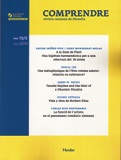Tanabe Hajime and the Hint of a Dharmic Finality
Article Sidebar

Main Article Content
James W. Heisig
Nanzan Institute for Religion
The Japanese philosopher, Tanabe Hajime (1885-1962) is taken up as an example of a thinker who, like the conference question, straddles intellectual histories East and West. Of all the Kyoto School philosophers, it was he who took history most seriously. He not only criticized Kantian, Hegelian, and Marxist notions of teleology and the modern scientific myth of “progress” on their own ground, but went on to counter these views of history with a logic of emptiness grounded in Buddhist philosophy. The essay concludes with an attempt to uncover the tacit assumption that allows Tanabe to make his arguments.
Article Details
Com citar
Heisig, James W. “Tanabe Hajime and the Hint of a Dharmic Finality”. COMPRENDRE: Revista catalana de filosofia, vol.VOL 13, no. 2, pp. 55-69, https://raco.cat/index.php/Comprendre/article/view/270916.
Drets
Drets d'autor
La revista Comprendre es publica en accés obert sota la llicència Creative Commons Reconeixement-NoComercial-CompartirIgual (by-nc-sa): No es permet un ús comercial de l’obra original ni de les possibles obres derivades, la distribució de les quals s’ha de fer amb una llicència igual a la que regula l’obra original.